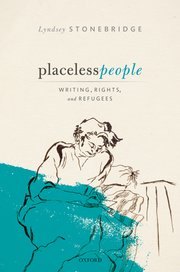 This symposium brings together four scholars to discuss Lyndsey Stonebridge’s Placeless People: Writings, Rights, and Refugees (Oxford University Press, 2018). It also includes a response essay from Stonebridge. Her book examines the relationship between statelessness and modern literature and thought. For writers such as Hannah Arendt, Franz Kafka, W.H. Auden, George Orwell, Samuel Beckett, Simone Weil, among others, the outcasts of the twentieth century raised vital questions about sovereignty, humanism and the future of human rights. Placeless People argues that we urgently need to reconnect with the moral and political imagination of these first chroniclers of the placeless condition.
This symposium brings together four scholars to discuss Lyndsey Stonebridge’s Placeless People: Writings, Rights, and Refugees (Oxford University Press, 2018). It also includes a response essay from Stonebridge. Her book examines the relationship between statelessness and modern literature and thought. For writers such as Hannah Arendt, Franz Kafka, W.H. Auden, George Orwell, Samuel Beckett, Simone Weil, among others, the outcasts of the twentieth century raised vital questions about sovereignty, humanism and the future of human rights. Placeless People argues that we urgently need to reconnect with the moral and political imagination of these first chroniclers of the placeless condition.
Content
This post is part of a symposium on Lyndsey Stonebridge’s Placeless People. All contributions to the symposium can be found here. “Literature is put to all kinds of political uses, public and private,” Philip Roth once observed, “but one oughtn’t confuse those uses with the hard-won reality that an author has succeeded in realizing in a work of art.” After reading Placeless People: Writing, Rights, and Refugees (2018), I wonder if Lyndsey Stonebridge would disagree. Works of literature that deal with human rights issues are
Read More »
This post is part of a symposium on Lyndsey Stonebridge’s Placeless People. All contributions to the symposium can be found here. Lyndsey Stonebridge’s Placeless People: Writing, Rights, and Refugees offers a historically rich, theoretically compelling, and literarily nuanced account of a question that has long underpinned scholarship on human rights: what is the relationship between literature and human rights? Several aesthetic forms are typically foregrounded when considering this question: sentimentalism as a mode of empathizing with the suffering other; the Bildungsroman as a genre that
Read More »
This post is part of a symposium on Lyndsey Stonebridge’s Placeless People. All contributions to the symposium can be found here. Placeless People cements Lyndsey Stonebridge’s position as one of the most committed and perceptive chroniclers of the Euro-U.S. intellectual milieu of the mid-twentieth century. Like her brilliant previous book, The Judicial Imagination: Writing After Nuremburg, Placeless People returns to this historical juncture to recover critiques of humanitarian thinking that were articulated at the time of human rights law’s formalization. Stonebridge describes this book as
Read More »
This post is part of a symposium on Lyndsey Stonebridge’s Placeless People. All contributions to the symposium can be found here. Although inequality continues to skyrocket in the United States—whether in income, wealth, education, or healthcare outcomes—and the much-heralded revitalization of national infrastructure has yet to materialize, the current administration has placed its electoral wager on a loud and very public demand for $12.2 billion to extend the border wall with Mexico under the pretext of a national emergency.[1] While such a wall would not
Read More »
This post is part of a symposium on Lyndsey Stonebridge’s Placeless People. All contributions to the symposium can be found here. It is always a special act of scholarly good faith to take time to read, respond, and write about one another’s work; I thank my colleagues for their generous care, attention, and criticism, and the editors of Humanity for creating this space for dialogue and future thinking. Two themes emerge from these responses to Placeless People: Writing, Rights, and Refugees, one methodological, the other
Read More »
 This symposium brings together four scholars to discuss Lyndsey Stonebridge’s Placeless People: Writings, Rights, and Refugees (Oxford University Press, 2018). It also includes a response essay from Stonebridge. Her book examines the relationship between statelessness and modern literature and thought. For writers such as Hannah Arendt, Franz Kafka, W.H. Auden, George Orwell, Samuel Beckett, Simone Weil, among others, the outcasts of the twentieth century raised vital questions about sovereignty, humanism and the future of human rights. Placeless People argues that we urgently need to reconnect with the moral and political imagination of these first chroniclers of the placeless condition.
This symposium brings together four scholars to discuss Lyndsey Stonebridge’s Placeless People: Writings, Rights, and Refugees (Oxford University Press, 2018). It also includes a response essay from Stonebridge. Her book examines the relationship between statelessness and modern literature and thought. For writers such as Hannah Arendt, Franz Kafka, W.H. Auden, George Orwell, Samuel Beckett, Simone Weil, among others, the outcasts of the twentieth century raised vital questions about sovereignty, humanism and the future of human rights. Placeless People argues that we urgently need to reconnect with the moral and political imagination of these first chroniclers of the placeless condition.